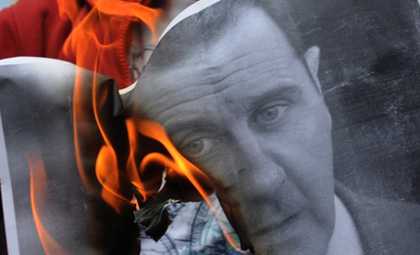
“Christians to Beirut and the Alawites to the coffin.”
This chant, which some Syrians say they’ve heard during demonstrations in their country, alludes to what many Syrian minorities fear might happen should the 40-year rule of the Baath regime come to an end.
Many experts agree that President Bashar al-Assad, an Alawite ruling a majority-Sunni country, has managed to keep his grip on power in part thanks to mutual backing between his regime and the country’s other minorities, a number of which is made up of educated, middle-class Christians. As a result, it comes as no surprise that a number of them voice worry about the regime’s possible downfall.
At the same time, “The regime has an active interest in frightening the Christians. And if you want to frighten someone, it’s always good if you have some evidence,” argues Professor Volker Perthes, director of SWP, the German Institute for International and Security Affairs in Berlin, referring to the abovementioned chants.
The regime, some experts say, is making it seem that fanatical Muslims are prepared to take over should the president and his cronies be pushed out.
But should Syria’s Christian community, which is around 10 percent of the population, actually be afraid?
A number of upper-middle-class Christians are still undecided, Ahed Al Hendi, a Syrian political refugee currently working for CyberDissidents.org in Washington, DC, told NOW Lebanon.
Many who have their own businesses fear the instability, said Al Hendi, who describes himself as a non-practicing Christian. They are pro-Assad and scared of the ascent to power of the Muslim Brotherhood or Salafists should Assad fall. “But I think it’s paranoia – I don’t think it is possible to have an Islamic dominance. For many reasons,” he said, starting with the fact that the population in Syria is much more diverse than in the rest of the region.
Compared to Egypt’s estimated 94-6 Muslim-to-Christian ratio, “Syria has Kurds, Alawites, Christians, and an overall more secular vibe, so it’s different,” he said.
“Christians seem to avoid strife and tend to their own business,” said one Lebanese woman, who is married to a Syrian Christian and just returned from Damascus. “But if you scratch a bit beneath the surface, you know that in their hearts, they feel the regime is wrong, [that it is] a dictatorship,” she said. The woman, who asked that her name not be printed to protect her in-laws in Syria, also said that the number of Christians engaged in the demonstrations is beginning to climb.
According to Professor Perthes, Christians and Alawites have been taking part in the demonstrations all along.
“The opposition has always made it very clear that confessional belonging doesn’t count for them,” he said during a phone interview with NOW Lebanon, noting longtime Christian and Alawite opposition activists Michel Kilo and Aref Dalila, respectively.
Unlike traditional sectarian or class battles, “The uprising in Syria… is rather a question of marginalization in a country where wealth is very much concentrated in Damascus,” stressed Perthes, noting that outlying areas, such as Homs and Hama, were always a “revolutionary hotspot.”
“It’s true, people are seeing it as a Muslim thing, because people are coming out of the mosque, but it’s known about Syria that there is no place to gather people without looking suspicious except in the mosques, or in football matches,” noted Al Hendi.
A video titled “Christians are with the Syrian revolution” that was uploaded onto YouTube on May 16 features Mar Agnathious Joseph the Third, Patriarch of Antioch for Syrian Catholics, stressing that Christians in Syria seek civil rights for everyone and have long been united with all the Syrian people to make the country prosper.
“One thing I would say is that the Christian community in Syria are very much citizens of Syria. They are very well grounded, a substantial minority, that has played a role in history,” said Harry Hagopian, an international lawyer in London and Middle East advisor of the Catholic Bishops’ Conference in England and Wales. But he stressed that there are tensions across all communities in Syria today, and that people should be wary of speculating too much on the situation from outside.
“My understanding is that many of those Christian communities would be happy and open to the sense of reform being requested for the past weeks,” he said, though he added it is hard to tell what the future holds, referring to the difficult plight of the Christians in Iraq and recent sectarian clashes in Egypt.
“But let me say another thing before we jump to conclusions: I have also been informed by many people that what is happening in Egypt,” Hagopian said in a reference to recent Muslim-Christian violence there, “has a lot to do with a sense of incitement that is being promoted, propagated and fed in by people from the former regime.”
Al Hendi stresses that the fear of sectarian strife in Syria is not realistic and stems from paranoia.
What’s more, things seem to be changing. “People are tearing photos of Assad out on the street,” he said. “We would have never even imagined this a few weeks ago. I think the fear is slowly starting to go.”
via Lebanon news – NOW Lebanon -Should Syrian Christians be afraid?.

Leave a Reply